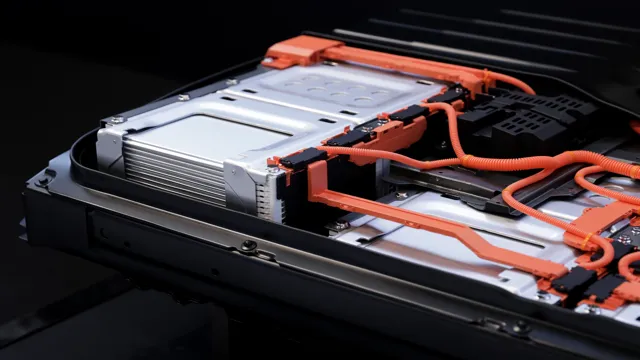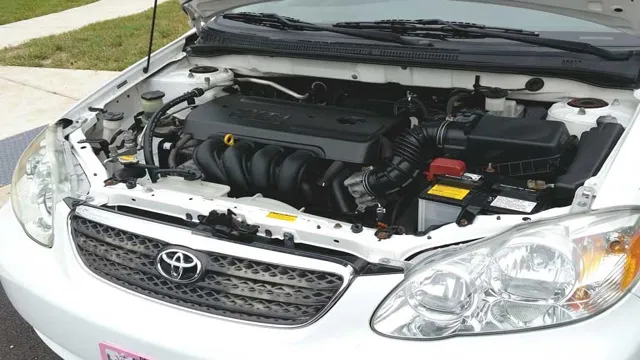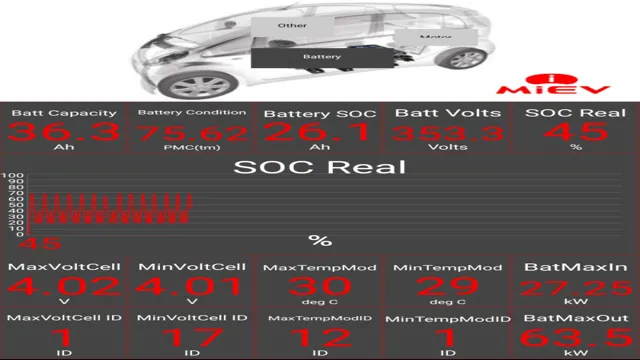Rev Up Your Career: Mastering Electric Car Battery Training for a Brighter Future
Electric cars have become increasingly popular in recent years, as more and more people are seeking eco-friendly ways to travel. However, while electric cars may be cheaper to own and operate, they come with one major drawback – the battery. The battery is the most critical component of the electric vehicle, and it is also the most expensive part to replace.
Hence, understanding how to maintain and repair electric car batteries is of utmost importance. In this blog, we will cover everything you need to know about electric car battery training. From the basics of how they work to the latest technological advancements, we will provide you with the knowledge and tools to keep your electric car running smoothly.
So, tighten your seatbelt and let’s get started!
The Basics of Electric Car Batteries
If you’re interested in working with electric car batteries, it’s important to first understand the basics. These batteries, also known as traction batteries, are the primary power source for electric vehicles. They store energy that is used to power the motor and provide movement to the car.
Unlike traditional lead-acid car batteries, electric car batteries are typically made of lithium-ion technology, which gives them a higher energy density. However, working with electric car batteries also requires specialized training due to the high-voltage systems involved. As an aspiring technician, it’s important to seek out electric car battery training to ensure safety and proper handling of these powerful batteries.
By gaining a strong understanding of these batteries, you can be well-equipped to work with electric cars and contribute to the growing field of clean transportation.
How Electric Car Batteries Work
Electric car batteries are at the heart of every electric vehicle, but how do they actually work? Essentially, they are the energy source that powers the car’s electric motor. These batteries are made up of several smaller cells, each filled with a chemical electrolyte solution and two electrodes – a cathode and an anode. When an electric charge is passed through the battery, the solution reacts with the electrodes to create a flow of electrons, which can then power the car’s motor.
The most common type of electric car battery is the lithium-ion battery, which is known for its high energy density and long lifespan. Despite their many benefits, electric car batteries can be complex and expensive to manufacture – but with advancements in technology, they are becoming more accessible and affordable for the average consumer.

Types of Electric Car Batteries
Electric Car Batteries Electric car batteries can be a bit confusing, especially for those who are new to the world of electric vehicles. The basic principles behind electric car batteries are relatively simple, but the different types of batteries available can be a bit bewildering. The three main types of electric car batteries are lithium-ion, nickel-metal hydride, and lead-acid.
Each type of battery has its own advantages and disadvantages. Lithium-ion batteries are currently the most popular type of battery due to their high energy density and long lifespan. Nickel-metal hydride batteries are less expensive than lithium-ion batteries but have a slightly lower energy density.
Lead-acid batteries are the least expensive option but have the lowest energy density and shortest lifespan. Ultimately, the best choice of electric car battery will depend on a number of factors, including cost, performance, and the specific needs of the vehicle owner.
Battery Life Expectancy
Electric car batteries are one of the most important components of an electric vehicle. They are responsible for providing the power that drives the electric motor. But with time, the battery life begins to dwindle, and the vehicle’s range is affected.
The lifespan of an electric car battery depends on various factors such as the type of battery, usage, temperature, and maintenance. Lithium-ion batteries are the most commonly used batteries in electric cars, and they have an average lifespan of 8-10 years or 100,000-150,000 miles. Proper maintenance is essential to increase the battery’s longevity, such as avoiding extreme temperatures and charging to full only when necessary.
Additionally, automakers offer various warranties on their battery packs, providing peace of mind to electric car owners. In conclusion, understanding the basics of electric car batteries and its life expectancy is crucial for electric car owners to maintain optimal performance and save on replacement costs in the long run.
Maintenance and Upkeep of Electric Car Batteries
To properly maintain and extend the lifespan of your electric car battery, it is important to receive proper electric car battery training. One important aspect of this training focuses on understanding the charging process. It is recommended to never let the battery’s charge level drop below 20% and to avoid charging it to 100% too frequently, as this can increase wear on the battery.
Additionally, it is important to avoid quick charging and high temperatures, which can also adversely affect the battery’s health. Proper electric car battery training can help you develop a maintenance routine that includes regular checks on the battery’s health and charging habits, extending the lifespan of your electric vehicle’s battery.
Charging an Electric Car Battery
Electric Car Battery Maintaining and caring for an electric car battery is vital for the longevity and efficient performance of the car. When charging an electric car battery, it’s important to consider the charging method and frequency of charging. One thing to keep in mind is that overcharging an electric car battery can have negative effects on its performance and lifespan.
Luckily, many electric cars come equipped with built-in charging controllers that prevent overcharging. Additionally, utilizing a level 2 charger at home can provide a faster and more convenient charge than a standard level 1 charger. Regularly checking the battery’s state of charge and avoiding letting it drop too low can also improve the battery’s performance and increase its lifespan.
It’s also essential to keep the battery at a moderate temperature, avoiding leaving it in extreme hot or cold temperatures as this can cause damage to the battery. Overall, maintaining an electric car battery comes down to proper charging habits and consistent upkeep, resulting in a happy battery and happy driving experience.
How to Monitor Battery Health
As electric cars become more prevalent, understanding how to monitor battery health is becoming increasingly important. The battery is the most valuable and vulnerable component in an electric car and learning how to maintain and upkeep it can maximize its lifespan. Several factors, such as temperature, the frequency of charges, and driving style can impact the health of a battery.
Regularly monitoring the state of charge, cell voltage, and temperature of the battery can help identify potential issues early, preventing further damage and costly repairs. Additionally, keeping the battery clean and avoiding exposing it to extreme temperatures can help preserve its longevity. Maintaining battery health is crucial for getting the most value out of an electric car and avoiding unnecessary repairs or replacements.
So, monitoring battery health is a key factor in ensuring optimal performance and longevity of an electric vehicle.
Tips for Extending Battery Life
As electric vehicles become more popular, it’s important to know how to properly maintain and upkeep their batteries. Regular maintenance can help extend the life of your battery and improve its overall performance. One important tip is to keep your battery cool, as high temperatures can accelerate degradation.
It’s also crucial to avoid letting your battery fully discharge, which can cause irreversible damage. Instead, aim to keep your battery charged between 20% and 80%. Another helpful suggestion is to avoid rapid charging whenever possible, as this can reduce the overall lifespan of your battery.
By practicing these tips and performing routine maintenance on your electric car battery, you can help ensure that your vehicle continues to run smoothly for years to come.
Replacing Electric Car Batteries
Electric car battery training is becoming increasingly important as more people switch to electric vehicles. Replacing electric car batteries is a critical task that requires specialized knowledge and skills. The process involves safely removing the old battery and installing a new one while ensuring all connections are secure.
Electric car battery replacement is not something that can be easily done by just anyone; it requires a certain level of expertise and training. As technology advances, electric car batteries are becoming more complex, and it’s essential to have up-to-date training on how to handle them. Without the necessary knowledge, attempting to replace an electric car battery can be dangerous and lead to further issues.
Proper electric car battery training not only ensures the safety of the technician performing the replacement but also the safety and longevity of the new battery. Therefore, it is crucial to ensure that any technician tasked with handling electric car batteries has undergone the proper training to perform the task effectively and safely.
When to Replace a Battery
Electric car batteries typically last for several years, but eventually they will need to be replaced. The lifespan of an electric car battery can vary depending on a few factors, such as driving habits and the climate in which the car is driven. Generally, electric car batteries are designed to last for several hundred thousand miles before needing to be replaced.
However, if you notice that your electric car battery is not holding a charge as well as it used to, it may be time to consider replacing it. This could lead to better overall performance and improved range, which is especially important for those who rely on their electric vehicle for daily use. Replacing an electric car battery can be a costly investment, but it’s important to consider the long-term benefits and potential cost savings in terms of fuel and maintenance expenses.
If you’re not sure whether or not your electric car battery needs to be replaced, it’s a good idea to consult with a professional mechanic or electric vehicle specialist.
Costs of Battery Replacement
Replacing electric car batteries can be costly. The price of battery replacement largely depends on the make and model of the electric vehicle. For instance, replacing the battery of a Tesla can cost tens of thousands of dollars, while the replacement of a Nissan Leaf battery can cost several thousand dollars.
Additionally, the age and condition of the battery can also impact the cost of the replacement. It is essential to note that the cost of replacing the battery is typically not covered by the warranty, so it’s crucial to research the cost of replacing the battery in advance if you plan to purchase an electric vehicle. However, with proper care and maintenance, electric car batteries can last for many years, which could ultimately offset the cost of replacement in the long run.
Getting Professional Electric Car Battery Training
If you are considering a career as an electric car technician or mechanic, then you need to know all about electric car battery training. Why? Because the battery is the heart of an electric car, and if you don’t know how to handle it properly, you could be putting yourself and your customers in danger. Getting professional electric car battery training can prepare you for the unique challenges of working on electric cars, from diagnosing battery issues to maintaining and replacing batteries safely and efficiently.
Not only will this training give you the skills you need to be a top-notch electric car technician, but it will also boost your credibility and earning potential in the industry. So, whether you’re just starting or looking to upskill, investing in electric car battery training could be the key to your success.
Conclusion
In conclusion, learning about electric car batteries is like learning how to feed a pet dragon. Just as dragons are magical creatures that require a certain type of fuel to thrive, electric car batteries are complex systems that require specific care and attention in order to perform at their best. However, unlike dragons, electric car batteries are not mythical creatures that only exist in fantasy tales – they are very much a reality and represent the future of sustainable transportation.
So, let’s charge up and get ready to fly into a cleaner, greener future with our electric car batteries!
FAQs
Why is electric car battery training important?
Electric car battery training is important because it teaches technicians how to properly diagnose, repair, and maintain the complex battery systems found in electric cars.
How long does electric car battery training usually take?
The length of electric car battery training can vary depending on the program, but it typically takes between six weeks to six months.
Do I need any prior experience to enroll in electric car battery training?
Prior experience in the automotive or electrical fields can be helpful, but it is not always necessary for enrollment in electric car battery training programs.
What topics are typically covered in electric car battery training programs?
Topics covered in electric car battery training programs may include battery chemistry and construction, safety protocols, diagnosis and repair of battery systems, and maintenance procedures.






